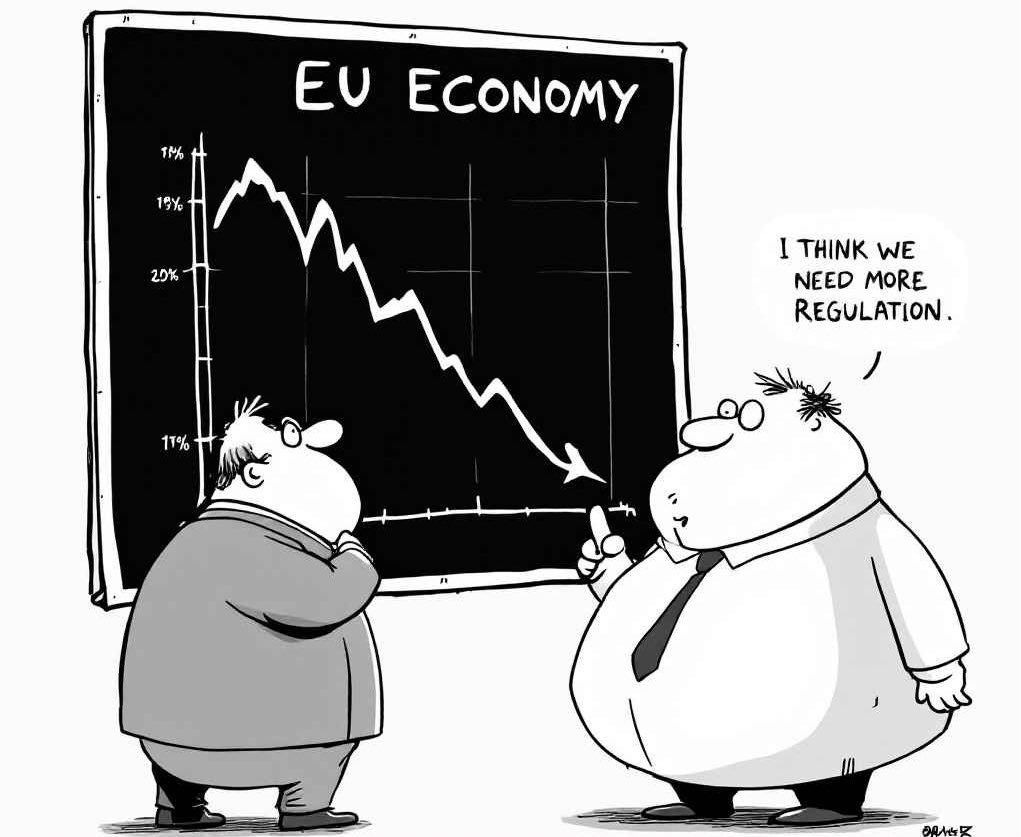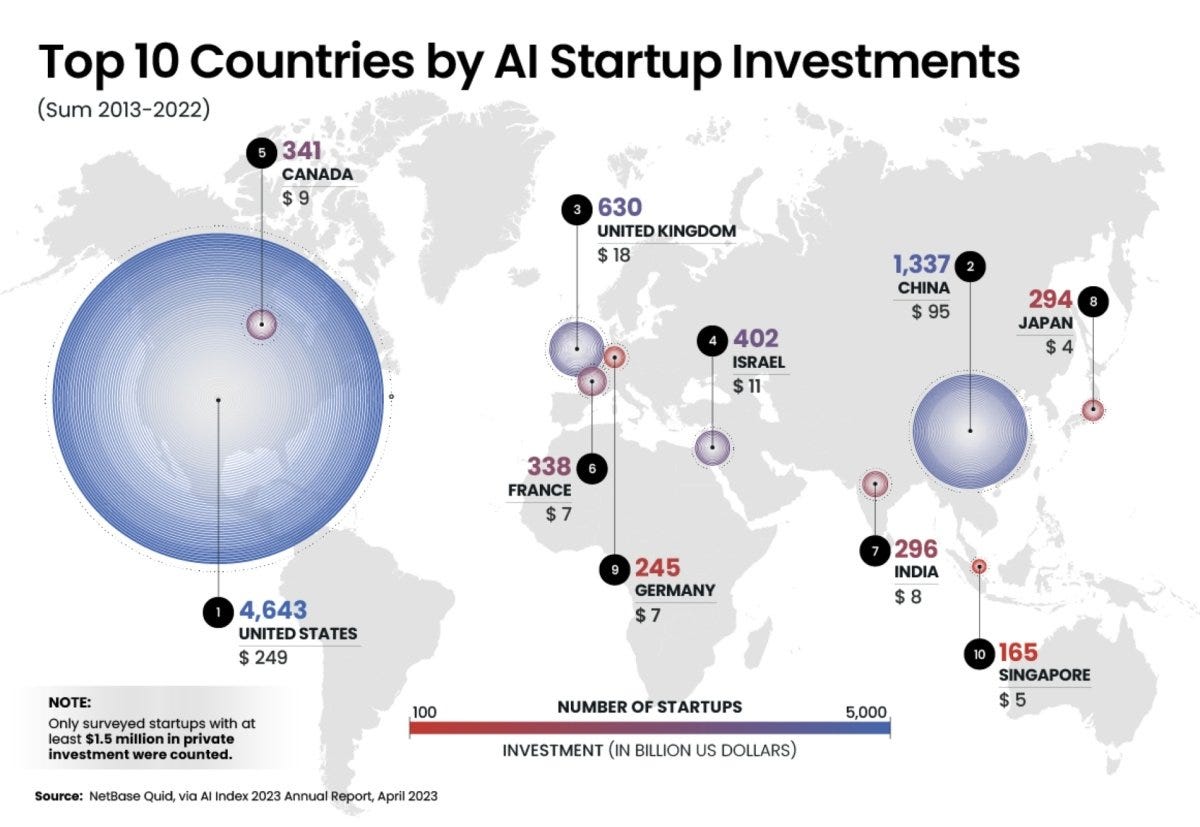European AI: Less Red Tape, More Agentic Innovation
A Call to Transform EU Regulation into a Competitive Edge

Europe often prides itself on being the “good boy” of global tech regulation, championing ethics, privacy, and accountability. But as the AI revolution accelerates, this virtue threatens to become a liability.
The landmark AI Act, crafted in good faith to protect citizens, now threatens to suffocate the very innovation it sought to guide. Its stringent requirements around copyright compliance, transparency, and risk mitigation are already creating an innovation chokehold. Startups, already scrambling to compete with well-funded U.S. and Chinese giants, now face a labyrinth of legal hurdles. The result? A growing exodus of talent, capital, and ambition, leaving Europe at risk of becoming a bystander in the defining technological shift of our era.
The stakes couldn’t be higher. As Apple, OpenAI, Meta and Anthropic increasingly withhold cutting-edge AI features from European users over regulatory fears, the U.S. solidifies its dominance in foundation models, while China races ahead with pragmatism (and minimal copyright scruples). Europe’s choice is stark: adapt or accept irrelevance.
The Problem: How the AI Act is Holding Back AI Innovation

The AI Act’s most controversial mandate, requiring developers to prove their models were trained on copyright-free or publicly licensed data, sounds reasonable in theory. But for startups, it’s a logistical and financial nightmare. Auditing massive datasets for copyright compliance is a herculean task, one that only deep-pocketed corporations can afford.
But that’s just the beginning. The Act’s broad definition of AI casts a wide regulatory net, potentially pulling even low-risk applications into its compliance regime. This overreach creates uncertainty for developers, making it difficult to determine what rules apply and discouraging innovation in areas that pose minimal risk.
The high compliance costs further stack the odds against startups. Conformity assessments, extensive documentation, and continuous monitoring (all mandatory under the Act) place an enormous financial burden on smaller companies. While industry giants can absorb these costs, startups with limited resources face a crushing disadvantage.
Then there’s the issue of delayed time-to-market. The EU’s extensive regulatory hurdles slow down AI development cycles, making it nearly impossible for agile startups to compete in a global landscape where speed is everything. In a field where first-mover advantage is critical, these bureaucratic delays could spell doom for European-born AI ventures.
Even Big Tech is wary, not just small startups. If the world’s largest and wealthiest tech companies find the AI Act too restrictive, what chance do startups have? Meta recently disabled its AI assistant, Meta AI, for European users, citing “regulatory uncertainty.” OpenAI quietly restricts access to voice cloning tools in the EU, and Google’s Gemini avoids entire markets over compliance fears. These aren’t small players struggling to keep up, these are trillion-dollar companies deciding that Europe’s rules are simply too difficult, too risky, or too costly to comply with.
Meanwhile, talent flees. European AI researchers increasingly decamp to Silicon Valley or Shenzhen, where funding flows freely and experimentation isn’t shackled by preemptive red tape and legal ambiguity. The Act’s vague classifications of AI risk levels leave developers second-guessing their own innovations, making compliance a constant guessing game rather than a clear roadmap.
In its attempt to lead on regulation, Europe may have written itself out of the AI race altogether.
The Geopolitical Stakes: US & China Are Pulling Ahead
The global race for artificial intelligence (AI) supremacy is intensifying, with the United States and China adopting distinct strategies that are propelling them ahead of Europe.
United States: Private Sector Dominance and Deregulation: In the US, the AI landscape is driven by private sector innovation. Companies like OpenAI, Anthropic, and Google lead with advanced models such as GPT-4, Claude 3, and Gemini, respectively. The U.S. government's approach has been to minimize regulatory barriers, fostering an environment where AI research and development can thrive. In a significant move to bolster AI infrastructure, President Donald Trump recently announced the Stargate initiative, a joint venture involving OpenAI, SoftBank, and Oracle. This project plans to invest up to $500 billion in AI infrastructure, including the construction of data centers and energy generation facilities across the United States. The initiative underscores the administration's commitment to accelerating AI development and maintaining a leading position in the global AI race.
China: State-Backed Ambitions and Rapid Implementation: China's approach to AI is characterized by substantial government support and a focus on rapid deployment. The Chinese government has committed significant funding to AI initiatives, including a $50 billion semiconductor fund to bolster its technological infrastructure. Companies like DeepSeek have emerged, developing state-of-the-art models efficiently and cost-effectively. This progress is facilitated by China's more lenient data regulations, allowing for swift integration of AI technologies across various sectors.
Europe: Risk of Becoming a Consumer Rather Than a Creator: In contrast, Europe faces challenges that could relegate it to the role of an AI consumer rather than a creator. Despite having a large consumer market and abundant talent, the EU lags behind global leaders like China and the US. Recurrent issues include excessive focus on AI risks and stringent regulations that stifle innovation. Notably, groundbreaking AI tools, such as OpenAI's Operator, are inaccessible in the EU due to regulatory delays, hampering competitiveness. Without cultivating homegrown AI champions, Europe risks dependence on foreign technologies for critical applications, from healthcare algorithms to defense systems, thereby ceding economic power and strategic autonomy.
The Silver Lining: Europe’s Counteroffensive
Not all hope is lost. A new wave of investment and ambition is brewing, led by France.
Macron’s €109 Billion Initiative: France is making AI a national priority under President Emmanuel Macron's leadership. He has announced a €109 billion investment plan to bolster the country's AI capabilities. This initiative includes substantial funding from international investors, such as €50 billion from the United Arab Emirates and €20 billion from Canadian firm Brookfield. A significant portion of these funds is allocated for developing advanced data centers, leveraging France's nuclear energy infrastructure to provide efficient and sustainable power solutions. This strategy not only enhances computational capacity but also positions France as a leader in eco-friendly AI development.
The EU’s €200 Billion InvestAI Program: Complementing national efforts, the European Union has launched the InvestAI initiative, aiming to mobilize €200 billion for AI advancement. This program focuses on establishing AI gigafactories, large-scale facilities equipped with cutting-edge technology to train sophisticated AI models. The initiative seeks to foster collaboration among member states, reduce reliance on external tech giants, and ensure that Europe remains competitive in the rapidly evolving AI landscape.
The EU-Inc Initiative: Streamlining Business Across Borders: In a bid to further enhance competitiveness, an online community led by Philipp Herkelmann has proposed the creation of "EU-Inc," a unified, digital-first private limited liability company structure for the European Union. This initiative aims to address the challenges of fragmented national regulations by establishing a standardized corporate framework governed by EU regulations. Key features include no minimum capital requirement, flexible share structures, and streamlined cross-border operations. The proposal seeks to make it easier for businesses to operate across EU member states, thereby fostering innovation and economic growth.
Learning from China’s DeepSeek: Europe is also drawing inspiration from international success stories. For instance, China's DeepSeek has demonstrated that significant AI advancements can be achieved with leaner, more cost-effective models. This approach underscores the potential for European startups to innovate efficiently, provided they navigate the regulatory environment effectively.
Through these concerted efforts, Europe aims to not only catch up with but also lead in the global AI race, balancing innovation with ethical considerations and strategic autonomy.
A Call for Regulatory Balance: Learning from Mistakes
The AI Act’s rigid early framework needs urgent recalibration. France is already pushing for carveouts to protect startups, arguing that “innovation cannot thrive under fear.” Key fixes could include:
Regulatory Sandboxes: The AI Act proposes the establishment of coordinated AI 'regulatory sandboxes' across EU member states. These sandboxes are controlled environments where businesses can develop, test, and validate AI systems under the supervision of national authorities before market deployment. This approach allows innovators to experiment with new technologies while ensuring compliance with regulatory standards. It also provides regulators with insights into emerging technologies, facilitating a balanced oversight mechanism.
Public Data Commons: To alleviate the burden of sourcing high-quality, copyright-free data, the EU could establish publicly funded repositories. These public data commons would offer startups access to extensive datasets necessary for training AI models, thereby reducing costs and promoting innovation. Such initiatives would ensure that smaller enterprises have the resources to develop competitive AI solutions without the prohibitive expenses associated with data acquisition.
Talent Fast Lanes: Attracting and retaining top AI talent is crucial for Europe's competitiveness. Implementing streamlined visa processes and offering tax incentives for AI professionals and researchers can make the EU a more appealing destination for global talent. These measures would help build a robust AI ecosystem, fostering collaboration and accelerating advancements within the region.
By adopting these strategies, the EU can strike a balance between maintaining ethical standards and promoting a dynamic, innovation-friendly environment for AI development.
The Opportunity: Europe’s Agentic AI Frontier
While the EU has fallen behind in foundational AI model development, the next wave of AI innovation is still up for grabs: Agentic AI, autonomous systems that act, reason, and collaborate. Unlike traditional AI models that require constant human input, these AI "agents" can execute tasks end-to-end, from managing supply chains to running customer service operations.
This shift toward Agentic AI is why I launched this newsletter. As an engineer and entrepreneur working at the intersection of AI and automation, I’ve seen firsthand how agentic systems can transform industries. While much of today’s AI conversation is dominated by large language models, the real opportunity lies in designing AI that doesn’t just generate text but acts autonomously to solve real-world problems. Europe, with its strengths in robotics, industrial automation, and ethical AI, is uniquely positioned to lead this transformation.
Why Agentic AI?
Lower Computational Demands: Unlike massive foundation models that require enormous GPU clusters, agentic AI is designed to be modular and efficient. These systems focus on task-specific reasoning rather than brute-force computation, making them cheaper to deploy and more accessible to startups.
Alignment with European Expertise: Europe has long been a leader in robotics, IoT, and industrial automation, all fields where agentic AI can thrive. Unlike the U.S., where AI is largely consumer-focused, Europe can build AI systems that enhance factories, optimize logistics, and power next-gen smart infrastructure.
Ethical Leadership
The EU’s emphasis on trust, safety, and transparency is a competitive advantage. In a world increasingly wary of AI’s black-box decision-making, Europe can become the go-to supplier of responsible, explainable AI that companies and governments can trust.
Agentic AI is still at the frontier of innovation. While the U.S. dominates foundation models and China races ahead in scale, Europe can carve out its own leadership niche by pioneering intelligent, autonomous systems that power the real economy.
This is the mission behind Designing Agentic Systems, to explore how AI agents can reshape industries, unlock new entrepreneurial opportunities, and drive the next wave of innovation. Europe still has a shot at winning this race. But it needs to act—now.




